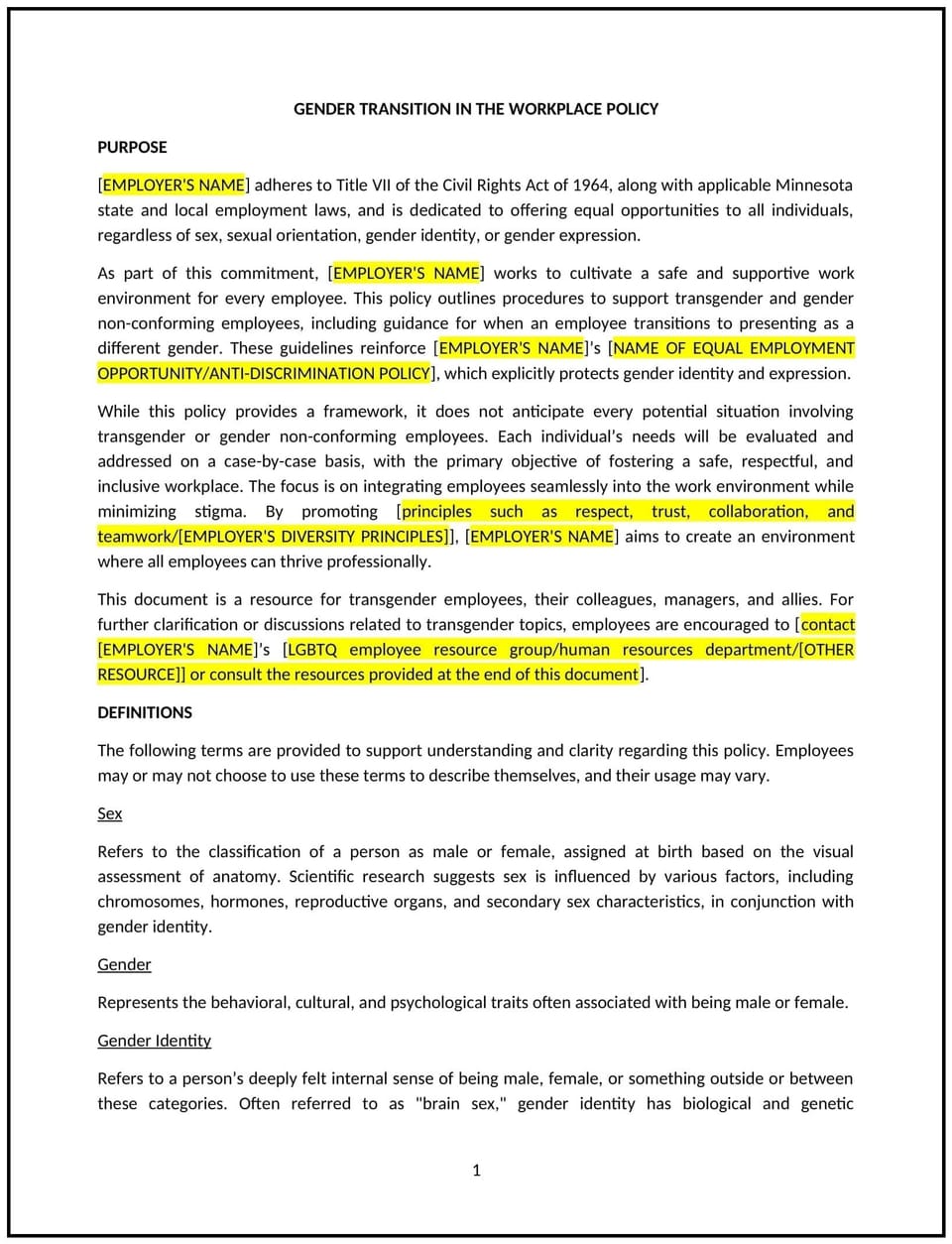Gender transition in the workplace policy (Minnesota): Free template

Gender transition in the workplace policy (Minnesota)
This gender transition in the workplace policy is designed to provide Minnesota businesses with guidelines for supporting employees who are transitioning gender. It outlines the steps businesses should take to ensure that employees transitioning in the workplace are treated with respect, dignity, and fairness, while maintaining a supportive and inclusive environment for all employees.
By implementing this policy, businesses can foster an environment of inclusion, reduce discrimination, and show their commitment to creating a respectful, diverse, and supportive workplace for all employees.
How to use this gender transition in the workplace policy (Minnesota)
- Define gender transition: Clearly outline what gender transition involves, including the personal and professional aspects of an employee's transition, such as changes in name, pronouns, and gender expression.
- Set expectations for respect and privacy: Ensure that employees and management understand the importance of using the correct name and pronouns for the transitioning employee and maintaining confidentiality about personal details related to the transition.
- Establish support systems: Outline the support available to employees undergoing gender transition, such as offering flexibility in work schedules, providing counseling or EAP services, and ensuring that employees feel comfortable discussing their needs with HR or managers.
- Set clear procedures for requesting accommodations: Specify how employees can request accommodations related to their gender transition, such as changes in uniforms, restroom access, or time off for medical appointments.
- Ensure equal treatment: Clarify that employees undergoing a gender transition will continue to have the same opportunities for advancement, promotions, and compensation as other employees, and that any discrimination will not be tolerated.
- Educate employees: Provide training for all employees to promote understanding and sensitivity to gender transition issues, focusing on creating an inclusive and supportive work environment for everyone.
Benefits of using a gender transition in the workplace policy (Minnesota)
Implementing this policy provides several advantages for Minnesota businesses:
- Promotes a culture of inclusion: By supporting employees through gender transitions, businesses can foster a work environment where all individuals feel respected, valued, and supported.
- Enhances employee morale and retention: Employees who feel supported during gender transitions are more likely to remain engaged and loyal to the organization, reducing turnover and increasing productivity.
- Strengthens diversity and reputation: Companies that demonstrate inclusivity and respect for diversity attract top talent and build a reputation as an employer of choice for diverse candidates.
- Reduces legal risk: By implementing clear policies, businesses can reduce the risk of discrimination lawsuits or complaints related to gender transition in the workplace.
- Reflects Minnesota-specific considerations: Tailors the policy to Minnesota’s labor laws, including state-specific protections for LGBTQ+ employees and cultural norms surrounding inclusivity and diversity.
Tips for using this gender transition in the workplace policy (Minnesota)
- Communicate clearly: Ensure that all employees understand the policy, its purpose, and the steps they need to take to support colleagues who are transitioning.
- Provide training and resources: Regularly offer training sessions on gender identity, sensitivity, and inclusivity to educate employees on how to be supportive and respectful toward transitioning individuals.
- Be open to accommodations: Offer flexibility and openness when discussing accommodations, such as adjusting dress codes, providing private spaces, or allowing time off for medical procedures.
- Maintain confidentiality: Ensure that personal information regarding an employee’s gender transition is kept confidential, shared only on a need-to-know basis, and handled with respect and sensitivity.
- Review regularly: Periodically review the policy to ensure it remains aligned with Minnesota-specific laws, workplace culture, and best practices in diversity and inclusion.
Q: What is considered gender transition?
A: Gender transition refers to the process an individual may go through to live as a gender different from the one assigned at birth. It can include physical, social, and/or legal changes such as changing one’s name, pronouns, and appearance, as well as undergoing medical procedures.
Q: How should employees address someone undergoing a gender transition?
A: Businesses should establish guidelines for using the correct name and pronouns for transitioning employees, which may include training on pronoun use and encouraging employees to respect each other’s preferences.
Q: Can an employee request accommodations during a gender transition?
A: Yes, employees can request reasonable accommodations related to their gender transition, such as changes in uniforms, restroom access, or time off for medical appointments. Businesses should provide a clear process for requesting and handling such accommodations.
Q: How can businesses ensure a supportive environment for employees transitioning?
A: Businesses should educate all employees on gender identity and create a culture of respect and inclusivity. This can include providing resources, offering support through HR or employee assistance programs, and maintaining open channels for employees to discuss their needs.
Q: Can employees be discriminated against during or after their gender transition?
A: No, businesses should ensure that all employees are treated fairly and equally, and that transitioning employees continue to have the same opportunities for promotions, compensation, and other workplace benefits. Discrimination or harassment based on gender identity is not tolerated.
Q: What should businesses do if an employee’s gender transition creates discomfort among other staff?
A: Businesses should provide education and resources to help employees understand gender identity and the importance of respect in the workplace. Managers should also address any concerns with sensitivity and ensure that the workplace remains a respectful and inclusive environment for all employees.
Q: How often should this policy be reviewed?
A: The policy should be reviewed annually to ensure it remains up-to-date with any changes to Minnesota’s laws, the company’s evolving needs, and best practices related to diversity, equity, and inclusion.
This article contains general legal information and does not contain legal advice. Cobrief is not a law firm or a substitute for an attorney or law firm. The law is complex and changes often. For legal advice, please ask a lawyer.


